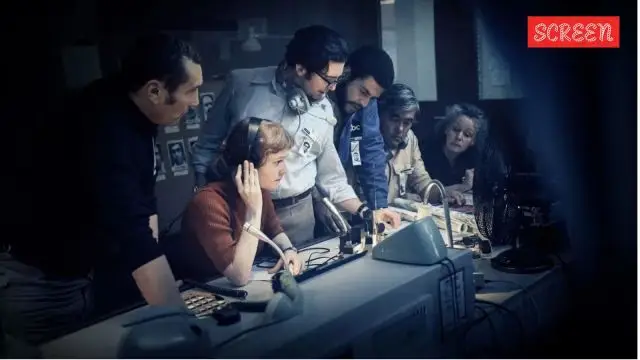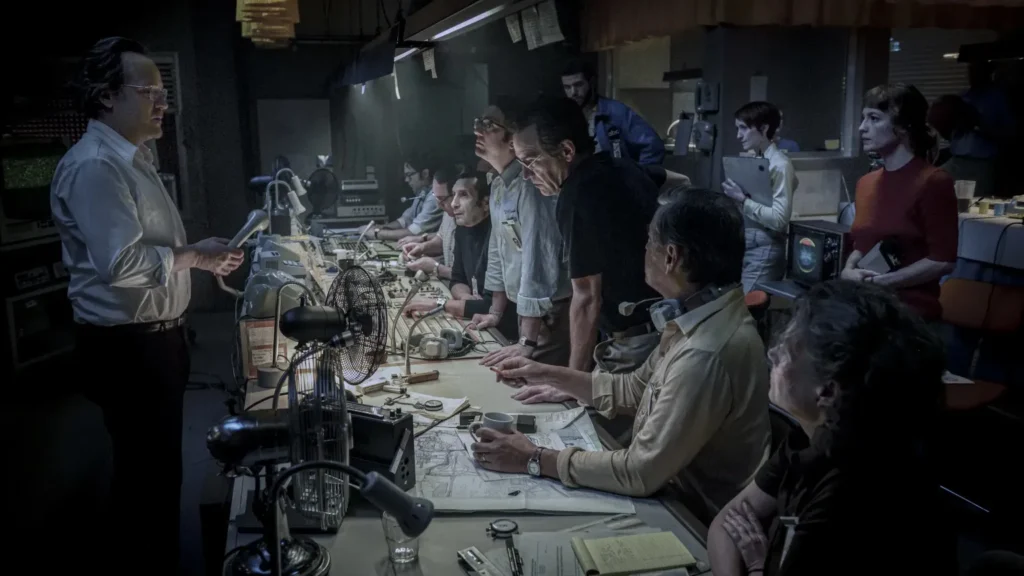September 5 movie review: John Magaro, Peter Sarsgaard star in a tense but thematically shallow retelling of the Munich massacre

September 5 movie review: Journalism Under Siege, History in Fragments
Some moments in history redefine global consciousness—irreversible events that fracture our understanding of politics, media, and conflict. The 1972 Munich Olympics hostage crisis, where members of the Palestinian terrorist group Black September took 11 Israeli athletes hostage and murdered them, stands as one such moment. Tim Fehlbaum’s September 5 doesn’t present this tragedy as a straightforward historical drama. Instead, he reframes the incident through the eyes of ABC Sports journalists—bystanders who became the world’s primary narrators during a horrifying real-time broadcast. What unfolds is less a political epic and more a psychological chamber piece, immersed in the aesthetics and pressure of a newsroom under siege.
Reframing the Tragedy Through a Journalistic Lens
Unlike Steven Spielberg’s Munich (2005), which chronicled Israel’s retaliation against the attackers, September 5 avoids any sweeping political or historical exploration. Fehlbaum doesn’t unpack Black September’s motives or engage with the massacre’s long-term impact. He focuses instead on the urgency of the moment—how journalists struggle to process and report what they barely understand. This is a film about perception, not context.

From Olympic Triumph to Live-Broadcast Crisis
The story opens in the glow of Olympic celebration. ABC Sports covers American swimmer Mark Spitz’s victory, a moment of national pride. In the control room, network president Roone Arledge (Peter Sarsgaard) decides to cut to the reaction of the defeated West German swimmer. His colleague Marvin Bader (Ben Chaplin) questions the move. Shouldn’t the focus stay on Spitz? Arledge replies, “It’s not political, it’s about the emotions.” That line becomes a thesis statement, as the film navigates the tension between emotional storytelling and objective reporting.
Overnight, everything collapses. Gunshots ring out. Whispers ripple through the control room—an attack has occurred. Soon, reports confirm that armed militants invaded the Israeli team’s quarters and took hostages, demanding the release of Palestinian prisoners. At this point, the film zooms in. The control room becomes the central setting. Producer Geoffrey Mason (John Magaro), on his first day in charge, must lead the coverage under unimaginable pressure.
Inside the Control Room: Tension, Ethics, and Chaos
Fehlbaum masterfully captures the newsroom’s escalating tension. The journalists make decisions based on instinct, juggle unclear facts, and weigh the consequences of every on-air word. Magaro anchors the film with a tightly wound performance. He plays Mason as a man unraveling slowly but methodically. His lack of backstory doesn’t matter—his situation speaks volumes. However, most of the supporting cast lacks depth. They exist more as functions than as characters, which weakens the emotional stakes.
Leonie Benesch provides a striking exception as Marianne Gebhardt, the team’s German translator. Though not central to the newsroom’s hierarchy, she brings a quiet emotional charge. She didn’t witness the Holocaust, but she carries its historical echo. Her reaction to the attack feels personal and deeply human. Benesch conveys more in a glance than others do in dialogue, grounding the film with a rare emotional resonance.
Process Over Politics
September 5 doesn’t dive into its characters’ inner lives. Instead, it obsesses over the process—how journalists collect, verify, and broadcast information in crisis. On that level, the film impresses. Fehlbaum and cinematographer Markus Förderer keep the camera locked inside the control room. Dim lighting and claustrophobic framing intensify the sense of entrapment. Composer Lorenz Dangel opts for subtle tension over orchestral dramatics, letting ambient sound and silence speak.
Still, the film keeps its audience at a distance. That coldness may be intentional, echoing the journalistic viewpoint, but it creates a barrier to emotional connection.
Avoiding Politics, Yet Becoming Political
The film’s most telling contradiction comes when Arledge insists, “It’s not political, it’s about the emotions.” Fehlbaum seems to embrace that idea—but inadvertently proves the opposite. By focusing solely on the emotions and excluding historical or political context, the film makes a political statement through omission. It avoids the deeper implications of the Munich massacre and, in doing so, feels incomplete.
That omission hits harder in 2025. With the Israel-Palestine conflict dominating current headlines, viewers can’t help but connect past and present. The film doesn’t need to editorialize, but by sidestepping the broader stakes, it risks appearing evasive.
Final Verdict
September 5 is about how we tell stories in real time—how journalism operates when facts are scarce and pressure is high. Like Spotlight or The Post, it focuses on process rather than spectacle. But unlike those films, it hesitates to explore the full impact of its subject. At 94 minutes, it remains tightly paced and well-acted. Its technical craft is undeniable. But for a story as consequential as the Munich massacre, the narrow lens feels limiting.
September 5
Director: Tim Fehlbaum
Cast: Featuring performances by John Magaro, Leonie Benesch, Peter Sarsgaard, Ben Chaplin, and Zinedine Soualem.
Rating: ★★½ / 5






